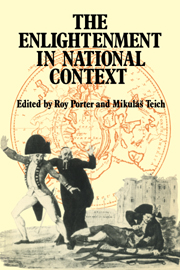Book contents
- Frontmatter
- Contents
- Preface
- 1 The Enlightenment in England
- 2 The Scottish Enlightenment
- 3 The Enlightenment in France
- 4 The Enlightenment in the Netherlands
- 5 The Enlightenment in Switzerland
- 6 The Italian Enlightenment
- 7 The Protestant Enlightenment in Germany
- 8 The Enlightenment in Catholic Germany
- 9 Reform Catholicism and Political Radicalism in the Austrian Enlightenment
- 10 Bohemia: From Darkness into Light
- 11 The Enlightenment in Sweden
- 12 The Russian Enlightenment
- 13 Enlightenment and the Politics of American Nature
- Afterword
- Notes to the text
- Further reading
- Index
7 - The Protestant Enlightenment in Germany
Published online by Cambridge University Press: 24 September 2009
- Frontmatter
- Contents
- Preface
- 1 The Enlightenment in England
- 2 The Scottish Enlightenment
- 3 The Enlightenment in France
- 4 The Enlightenment in the Netherlands
- 5 The Enlightenment in Switzerland
- 6 The Italian Enlightenment
- 7 The Protestant Enlightenment in Germany
- 8 The Enlightenment in Catholic Germany
- 9 Reform Catholicism and Political Radicalism in the Austrian Enlightenment
- 10 Bohemia: From Darkness into Light
- 11 The Enlightenment in Sweden
- 12 The Russian Enlightenment
- 13 Enlightenment and the Politics of American Nature
- Afterword
- Notes to the text
- Further reading
- Index
Summary
The Aufklärung is one of the most misunderstood phenomena of German history. The dissolution of the Holy Roman Empire, the experience of rapid economic development and industrialization, the emergence of nationhood and fervent aggressive patriotism have obscured the realities of the eighteenth century. On an intellectual level reaction against the Aufklärung was very rapid: Romantic idealism formed the bridge to another age in which the ideals of the Aufklärer appeared not only irrelevant but dangerous. By the early decades of the twentieth century the rejection seemed complete: in 1940 one textbook dismissed the Aufklärung as a ‘weapon manipulated by Freemasons and Jews’.
Nor has the so-called ‘second enlightenment’ of the Federal Republic fully restored the balance. The Aufklärer have been rehabilitated, but they are still too often manipulated in an ahistorical sense. Lessing's pronouncements on the inevitability of social conflict and inequality are applied within the context of a modern capitalist society of which he was totally ignorant. The complex categories of modern scholarship have done little to elucidate the thoughts and actions of men who sought salvation in rational simplicity. Lessing and his contemporaries have been removed from the world in which they lived, a world which both inspired their thoughts and constrained their actions. On the one hand an effort has been made to harness their ideals to the political needs of the present.
- Type
- Chapter
- Information
- The Enlightenment in National Context , pp. 106 - 117Publisher: Cambridge University PressPrint publication year: 1981
- 4
- Cited by



